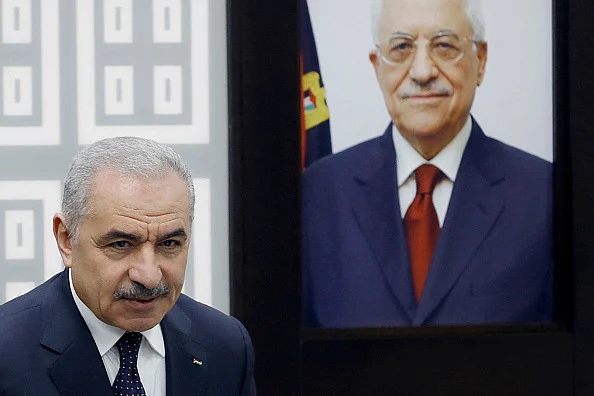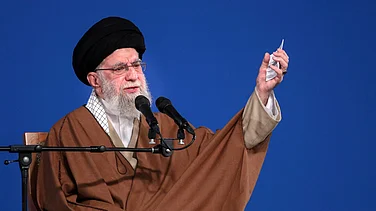Palestinian Prime Minister Mohammed Shtayyeh tendered his resignation and dissolved the Palestinian Authority (PA) government on Monday, as Israel’s war on Gaza – now in its fifth month – rages on. The move is expected to pave the way for a rejig in the PA in accordance with the post-war reality of Palestine as imagined by the United States. However, Palestinians say that little regard has been given to their demands of autonomy by the West and its allies.
Submitting his resignation to President Mahmoud Abbas, Shtayyeh said, “I see that the next stage and its challenges require new governmental and political arrangements that take into account the new reality in Gaza and the need for a Palestinian-Palestinian consensus based on Palestinian unity and the extension of unity of authority over the land of Palestine.” But what impact will his resignation have on Palestine?
What is the Palestinian Authority?
The PA was created in the early 1990s as an interim governing body through peace agreements signed as part of the Oslo Accords, between Israel and the Palestine Liberation Organization (PLO), then led by Yasser Arafat.
The body was granted limited autonomy in parts of the West Bank and Gaza and was supposed to pave the way for Palestinian statehood in lands that Israel captured in the 1967 Mideast war.
But several rounds of peace talks collapsed and both sides were unable to reach a final agreement. Mahmoud Abbas was elected president of the PA in 2005. However, Hamas won a landslide victory in parliamentary elections the following year.
While Abbas’ Fatah party, that dominates the PA, recognised the state of Israel, Hamas has refused to do so. The ensuing power struggle between Fatah party and Hamas boiled over in 2007, with Hamas taking over control of Gaza after a week of fighting. This effectively confined Abbas' authority to parts of the Israeli-occupied West Bank. Hamas has been ruling Gaza since it defeated Fatah in 2006.
Why was PA unpopular with Palestinians?
Abbas' popularity has taken a hit in recent years, with opinion polls consistently finding that a large majority of Palestinians want him to resign. The PA's security cooperation with Israel, which Abbas had previously described as their ‘sacred responsibility’ has been unpopular among Palestinians. Many of them view it as a subcontractor of Israel’s occupation of the region, according to a report by Reuters.
An opinion poll conducted by Palestinian Center for Policy and Survey Research in March 2023, shows that 63 per cent of respondents in the West Bank and Gaza viewed the PA as a burden on the Palestinian people. Further, 82 per cent of those surveyed think there is corruption in the PA institutions, while 71 per cent think there is corruption in the public institutions administered by Hamas.
Meanwhile, rapid expansion of Israeli settlements and Israeli military control in the West Bank and annexed East Jerusalem, has continued under Abbas’ rule. While his mandate expired in 2009, he has refused to hold elections, citing Israeli restrictions. To this day, he holds power as President.
What does Israel and the West think of PA?
The West and its allies have been pushing for a broader postwar settlement in which Saudi Arabia would recognise Israel and join other Arab states and a revamped PA in helping to govern post-war Gaza — all in exchange for a credible path to the establishment of an independent Palestinian state.
However, Israeli Prime Minister Benjamin Netanyahu, whose government is opposed to Palestinian statehood, has said the PA should have no role in postwar Gaza. In a press conference in November 2023, Netanyahu claimed PA fuels hatred of Israel, and criticised its policy of allegedly giving salaries to families of Palestinians imprisoned in Israel, according to a report by Reuters. Such an organisation should not take charge of Gaza, he told reporters.
He says Israel will maintain open-ended security control over the territory while local Palestinian leaders will administer civilian affairs.
How does this change things for Palestinians?
Israel’s war on Gaza, which has killed over 30,000 people, has now entered its fifth month. Netanyahu had vowed to completely ‘destroy Hamas’ and that their offensive in the region will not end until that is achieved. Meanwhile, at least one quarter of Gaza's population – 576,000 people – are one step away from famine and virtually the entire population desperately needs food resulting in aid trucks being shot at, looted and overwhelmed by hungry people, top UN officials said on Tuesday.
However, with U.S. backing for a ‘reformed PA’ – even though the body doesn’t have support of Palestinians – and Israel pushing its plan of ‘open-ended control’ over the territory, little regard has been given to what Palestinian people want. “The Palestinian public clearly demands a leadership that can head a democratic, national entity capable of fulfilling the Palestinian national aspirations, including creating an independent state and realising the Palestinians’ right of return to their homelands,” Samer Jaber, a political activist and researcher writes in Al Jazeera.
He says if the PA is revamped, it would imply intensifying the ongoing cooperation with Israel and providing Israeli settlers with more security. “As a result, the Palestinian people will continue to perceive the PA as illegitimate and public anger, upheaval and resistance will continue to grow.”




























